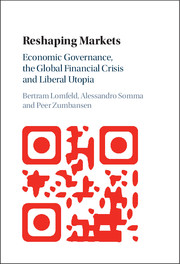Book contents
- Reshaping Markets
- Reshaping Markets
- Copyright page
- Contents
- Figures
- Contributors
- Introduction: reshaping markets and the question of agency
- Part I Crisis and normality in transnational market regulation
- Part II Austerity woes: trials and tribulations of debt
- Part III Reforming finance: systemic risk and accountability
- Part IV Transforming contract
- Part V Conceptual Utopia: the market after the market
- 14 The Truth of the market
- Epilogue: the power of law to reshape markets
- Index
- References
14 - The Truth of the market
from Part V - Conceptual Utopia: the market after the market
Published online by Cambridge University Press: 05 May 2016
- Reshaping Markets
- Reshaping Markets
- Copyright page
- Contents
- Figures
- Contributors
- Introduction: reshaping markets and the question of agency
- Part I Crisis and normality in transnational market regulation
- Part II Austerity woes: trials and tribulations of debt
- Part III Reforming finance: systemic risk and accountability
- Part IV Transforming contract
- Part V Conceptual Utopia: the market after the market
- 14 The Truth of the market
- Epilogue: the power of law to reshape markets
- Index
- References
- Type
- Chapter
- Information
- Reshaping MarketsEconomic Governance, the Global Financial Crisis and Liberal Utopia, pp. 319 - 346Publisher: Cambridge University PressPrint publication year: 2016

